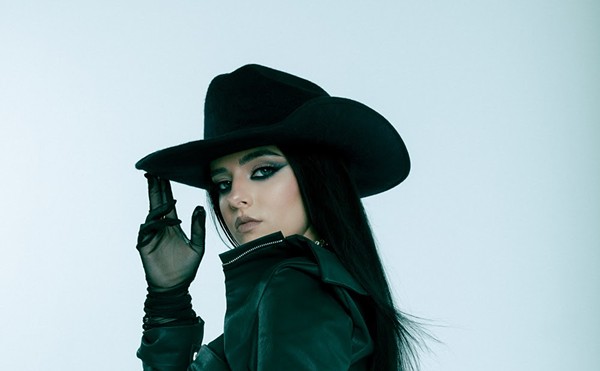Andy Summers Talks About the Multi-Media Show He's Bringing to Kent Stage
The Police guitarist says he enjoys connecting with fans in small theaters
By Jeff Niesel on Fri, Oct 13, 2023 at 8:45 am
[
{
"name": "Ad - NativeInline - Injected",
"component": "38482495",
"insertPoint": "3",
"requiredCountToDisplay": "5"
},{
"name": "Real 1 Player (r2) - Inline",
"component": "38482494",
"insertPoint": "2/3",
"requiredCountToDisplay": "9"
}
]
On the current multi-media tour he's dubbed the Cracked Lens + A Missing String, guitarist Andy Summers plays guitar to several sequences of his photography (he's taken photos all over the world).
A Rock Hall Inductee, Summers, who famously was a member of the Police before embarking on a solo career, has recently released both a new book of photographs (A Series of Glances) and a new solo album (Harmonics of the Night). He originally took a version of this show out in 2019, and that tour culminated with a performance at the Metropolitan Museum of Art in New York.
In this interview from an Albany, NY tour stop, Andy Summers speaks about the upcoming show that takes place at 6:30 p.m. on Monday at the Kent Stage in Kent. It's his only performance in Ohio.
You went on a similar tour back in 2019. Talk about what that tour was like and how this tour compares.
That was my first passing of this set-up, if you want to call it that. I was cut off by COVID, as were most people. I’m very happy to be back out in non- or semi-COVID times. In fact, it’s kind of strange. It’s like something science fiction. I feel like my mind got wiped out during those three years, but we’re out doing the show now and having a good time.
Talk about what you like about the format of your performance. It’s pretty unique that you show your photos and play guitar and talk.
What’s the right word? Proud? It’s a lot of work. It’s also a work-in-progress. Pre-COVID, I was doing it a certain way. That seems simplistic now compared to what we’ve got. The show has been completely reviewed. We got about 10 shows done. We tried certain things and technology changed. Technology has changed, so we are doing things in a slightly slicker way. In some ways, it’s like a new thing. I don’t think anyone is doing anything like it. It’s my photography in a very specific sequence, and I play various pieces of music in specific sequences as the photos go by — some with backing tracks and some familiar and some not so familiar. I don’t read from my book [of fiction], but I do a lot of talking, and I do tell stories. I like to be on the stage wandering about as I talk to the audience. That’s what we’ve got at this point. It goes down like a storm every night. We are trying to make a documentary movie of me doing this stuff. We’ll see what we get at the end.
When did your interest in photography start?
To be honest, it started in 1979. I was in New York with the Police. I say "started" because I bought a serious camera in 1979 because we were on the road, and it looked like we were never going to be off the road. I made the decision and said to myself, “You are going to buy a good camera.” I went to B&H in New York and got a good camera and started studying and pursuing it. It seemed very natural to me. I seemed to have a knack for it.
Your interest must go back farther than that.
This is my theory. When I was 14, 15, 16 years old growing up, I used to go to see arthouse films in my hometown in England. All the guys — Truffaut, Fellini, Godard. I would see all these films. It was like a teenage education. They made a big emotional impact on me. I wanted to be a film director but was obsessed with the guitar, and that’s where I went with it. When I started doing this, it’s a re-creation of that emotion. I started in New York, which is a great place. Recently, in the middle of all the pandemic stuff, the one thing I did do was I went to Leica headquarters in the middle of Germany. It’s a beautiful place. I did a performance there like I’ve been talking about. That was an embracing of the whole thing. They made this Andy Summers signature camera for me. It’s like a sub-career to my life as a musician.
You’ve taken photos all over the world. Do you have stories about them?
I have a story about everything. I can’t talk all night because it would move into a standup show. I talk about terrible shit happening and funny circumstances. I wasn’t doing that before, but my manager encouraged me to do that. I’m not an introvert. I can do it. Even then, you do it and think about it. Now that I’m seeing how it goes, I’m thinking about other stories I have. You tell a story, and, unless you are doing something serious, you want it have a punchline and be amusing. It’s a good move.
You have a great picture of a boy wearing a mask in Mexico. What’s the story there?
That’s a pretty new picture taken within the last year. It was one of the last ones to make it into the book. I was in Oaxaca. I went there with a friend for about a week. There’s a set of ruins there. We were enjoying life in a small Mexican town, and we were trying to go to the ruins, and it was literally a Saturday afternoon, which is when these things tend to happen. There was a huge parade in town, and it was very exotic with the masks and costumes. There I was, luckily with a camera, and I followed to see if I could get a shot off.
Your new album, Harmonics of the Night, completes a trilogy. What did you want to achieve with the three albums?
Those three albums came together throughout the pandemic. I was supposed to have a huge group of musicians. I play drums and bass too and whatever is laying around the studio. I do think of it as a trilogy. There has been a gap because of the circumstances we’ve been through. I intend to get back in the studio and will do a more ballsy guitar bass and drums record. I always have loads of material. I want to do something different like a record with a cellist. I know this cellist in L.A. who plays rock and jazz and is really very good. I feel like I need to make up for lost time for the past three years.
Twenty years ago, you were inducted into the Rock Hall as a member of the Police. Talk about what that meant to you.
It was early days and a given. I have a slightly jaundiced take. I don’t think I need to explain that to you. It’s all that business about being in the business. But it was nice. We liked it, and we did the show, and it went well.
You’ve played some of the world’s biggest arenas. What do you like about performing in small halls such as the Kent Stage?
I feel pretty good about it. Everywhere I played on this tour have been these beautiful theaters. I just played one in Quebec City. It’s very nice. When you play a stadium, you just play to the other guys in the band. These medium-sized theaters are all very beautiful, and I can connect to the audience. It really works. It’s intimate and, we have a huge screen to show my photos. I’m enjoying it. I don’t think, “Oh God, what happened to me?”
Coming soon: Cleveland Scene Daily newsletter. We’ll send you a handful of interesting Cleveland stories every morning. Subscribe now to not miss a thing.
Follow us: Google News | NewsBreak | Instagram | Facebook | Twitter
A Rock Hall Inductee, Summers, who famously was a member of the Police before embarking on a solo career, has recently released both a new book of photographs (A Series of Glances) and a new solo album (Harmonics of the Night). He originally took a version of this show out in 2019, and that tour culminated with a performance at the Metropolitan Museum of Art in New York.
In this interview from an Albany, NY tour stop, Andy Summers speaks about the upcoming show that takes place at 6:30 p.m. on Monday at the Kent Stage in Kent. It's his only performance in Ohio.
You went on a similar tour back in 2019. Talk about what that tour was like and how this tour compares.
That was my first passing of this set-up, if you want to call it that. I was cut off by COVID, as were most people. I’m very happy to be back out in non- or semi-COVID times. In fact, it’s kind of strange. It’s like something science fiction. I feel like my mind got wiped out during those three years, but we’re out doing the show now and having a good time.
Talk about what you like about the format of your performance. It’s pretty unique that you show your photos and play guitar and talk.
What’s the right word? Proud? It’s a lot of work. It’s also a work-in-progress. Pre-COVID, I was doing it a certain way. That seems simplistic now compared to what we’ve got. The show has been completely reviewed. We got about 10 shows done. We tried certain things and technology changed. Technology has changed, so we are doing things in a slightly slicker way. In some ways, it’s like a new thing. I don’t think anyone is doing anything like it. It’s my photography in a very specific sequence, and I play various pieces of music in specific sequences as the photos go by — some with backing tracks and some familiar and some not so familiar. I don’t read from my book [of fiction], but I do a lot of talking, and I do tell stories. I like to be on the stage wandering about as I talk to the audience. That’s what we’ve got at this point. It goes down like a storm every night. We are trying to make a documentary movie of me doing this stuff. We’ll see what we get at the end.
When did your interest in photography start?
To be honest, it started in 1979. I was in New York with the Police. I say "started" because I bought a serious camera in 1979 because we were on the road, and it looked like we were never going to be off the road. I made the decision and said to myself, “You are going to buy a good camera.” I went to B&H in New York and got a good camera and started studying and pursuing it. It seemed very natural to me. I seemed to have a knack for it.
Your interest must go back farther than that.
This is my theory. When I was 14, 15, 16 years old growing up, I used to go to see arthouse films in my hometown in England. All the guys — Truffaut, Fellini, Godard. I would see all these films. It was like a teenage education. They made a big emotional impact on me. I wanted to be a film director but was obsessed with the guitar, and that’s where I went with it. When I started doing this, it’s a re-creation of that emotion. I started in New York, which is a great place. Recently, in the middle of all the pandemic stuff, the one thing I did do was I went to Leica headquarters in the middle of Germany. It’s a beautiful place. I did a performance there like I’ve been talking about. That was an embracing of the whole thing. They made this Andy Summers signature camera for me. It’s like a sub-career to my life as a musician.
You’ve taken photos all over the world. Do you have stories about them?
I have a story about everything. I can’t talk all night because it would move into a standup show. I talk about terrible shit happening and funny circumstances. I wasn’t doing that before, but my manager encouraged me to do that. I’m not an introvert. I can do it. Even then, you do it and think about it. Now that I’m seeing how it goes, I’m thinking about other stories I have. You tell a story, and, unless you are doing something serious, you want it have a punchline and be amusing. It’s a good move.
You have a great picture of a boy wearing a mask in Mexico. What’s the story there?
That’s a pretty new picture taken within the last year. It was one of the last ones to make it into the book. I was in Oaxaca. I went there with a friend for about a week. There’s a set of ruins there. We were enjoying life in a small Mexican town, and we were trying to go to the ruins, and it was literally a Saturday afternoon, which is when these things tend to happen. There was a huge parade in town, and it was very exotic with the masks and costumes. There I was, luckily with a camera, and I followed to see if I could get a shot off.
Your new album, Harmonics of the Night, completes a trilogy. What did you want to achieve with the three albums?
Those three albums came together throughout the pandemic. I was supposed to have a huge group of musicians. I play drums and bass too and whatever is laying around the studio. I do think of it as a trilogy. There has been a gap because of the circumstances we’ve been through. I intend to get back in the studio and will do a more ballsy guitar bass and drums record. I always have loads of material. I want to do something different like a record with a cellist. I know this cellist in L.A. who plays rock and jazz and is really very good. I feel like I need to make up for lost time for the past three years.
Twenty years ago, you were inducted into the Rock Hall as a member of the Police. Talk about what that meant to you.
It was early days and a given. I have a slightly jaundiced take. I don’t think I need to explain that to you. It’s all that business about being in the business. But it was nice. We liked it, and we did the show, and it went well.
You’ve played some of the world’s biggest arenas. What do you like about performing in small halls such as the Kent Stage?
I feel pretty good about it. Everywhere I played on this tour have been these beautiful theaters. I just played one in Quebec City. It’s very nice. When you play a stadium, you just play to the other guys in the band. These medium-sized theaters are all very beautiful, and I can connect to the audience. It really works. It’s intimate and, we have a huge screen to show my photos. I’m enjoying it. I don’t think, “Oh God, what happened to me?”
Coming soon: Cleveland Scene Daily newsletter. We’ll send you a handful of interesting Cleveland stories every morning. Subscribe now to not miss a thing.
Follow us: Google News | NewsBreak | Instagram | Facebook | Twitter
SCENE Supporters make it possible to tell the Cleveland stories you won’t find elsewhere.
Become a supporter today.
About The Author
Jeff Niesel
Jeff has been covering the Cleveland music scene for more than 20 years now. And on a regular basis, he tries to talk to whatever big acts are coming through town, too. If you're in a band that he needs to hear, email him at [email protected].
Scroll to read more Music News articles
Newsletters
Join Cleveland Scene Newsletters
Subscribe now to get the latest news delivered right to your inbox.



















